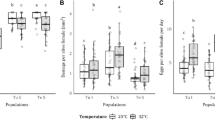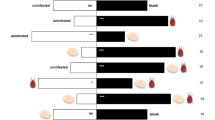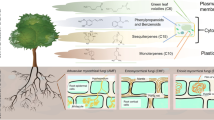Abstract
We measured the effect of elevated CO2 on populations of the western flower thrips, Frankliniella occidentalis and on the amount of leaf damage inflicted by the thrips to one of its host plants, the common milkweed, Asclepias syriaca. Plants grown at elevated CO2 had significantly greater aboveground biomass and C:N ratios, and significantly reduced percentage nitrogen. The number of thrips per plant was not affected by CO2 treatment, but the density of thrips (numbers per gram aboveground biomass), was significantly reduced at high CO2. Consumption by thrips, expressed as the amount of damaged leaf area per capita, was significantly greater at high CO2, and the amount of leaf area damaged by thrips was increased by 33%. However overall leaf area at elevated CO2 increased by 62%, more than compensating for the increase in thrips consumption. The net outcome was that plants at elevated CO2 had 3.6 times more undamaged leaf area available for photosynthesis than plants at ambient CO2, even though they had only 1.6 times the overall amount of leaf area. This study highlights the need for measuring the effects of herbivory at the whole-plant level and also the importance of taking herbivory into account when predicting plant responses to elevated CO2.
Similar content being viewed by others
Author information
Authors and Affiliations
Additional information
Received: 9 January 1996 /Accepted: 30 July 1996
Rights and permissions
About this article
Cite this article
Hughes, L., Bazzaz, F. Effect of elevated CO2 on interactions betwe en the western flower thrips, Frankliniella occidentalis (Thysanoptera: Thripidae) and the common milkweed, Asclepias syriaca . Oecologia 109, 286–290 (1997). https://doi.org/10.1007/s004420050085
Issue Date:
DOI: https://doi.org/10.1007/s004420050085




